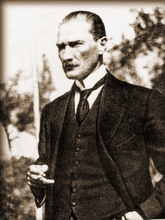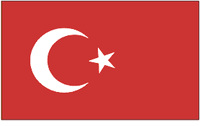Occasionally, Mustafa Kemal listened, and to no one more carefully than to Ziya (Gökalp), an intellectual born in Diyarbakır, in the Kurdish area.... Like many of his contemporaries, Gökalp was strongly influenced by French writers, in his case particularly by the sociologist Emile Durkheim (1858-1917), from whom he derived his notion of religion as social cement. Religion, Gökalp believed, inspired culture, which was specific to individual national societies, while civilization, meaning primarily science and technology, was universal. Like other members of the CUP, Gökalp started by defending the concept of a common Ottoman patriotism. But, before long, he became the chief ideologist of a Western-oriented Turkish nationalism, based not on ethnic origin, but on common culture and language.... Mustafa Kemal learnt from him 'the ideals of nationalism and of populism, which were to inform the republic of Turkey...'.[page 95/96 of Andrew Mango's biography]
Continuing his report of the "intellectual ferment" (and how!) of this period, Mr. Mango reports: "An influential literary review,
Genç Kalemler (Young Pens), campaigned for a simpler Turkish language, relying more on its own vocabulary than on borrowings from Arabic and Persian. It was in
Genç Kalemler that Ziya Gökalp published his celebrated poetic manifesto of Pan-Turanianism, the romantic ideology which sought the union of all Turkic-speaking peoples:
The country of the Turks is not Turkey, nor yet Turkistan,
Their country is a vast and eternal land: Turan!
Fascinating.


No comments:
Post a Comment